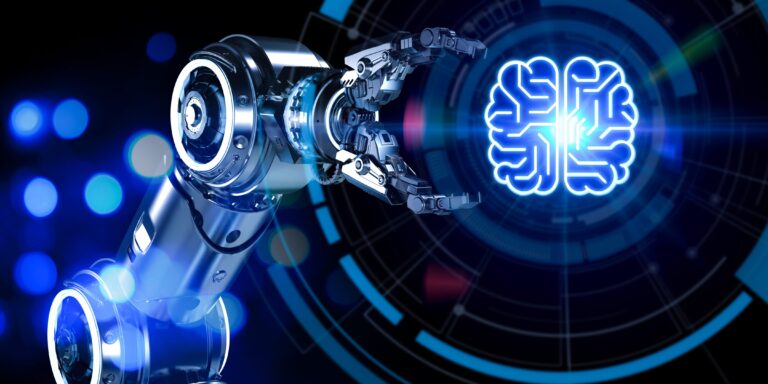Introduction
Machine learning (ML), a subset of artificial intelligence, is significantly transforming how industries operate and compete by automating complex processes, enhancing decision-making, and innovating service delivery. This technology leverages algorithms that learn from data to make predictions and decisions without being explicitly programmed. Across sectors—from healthcare to finance, manufacturing to retail—machine learning is not just a futuristic concept but a vital tool already reshaping real-world business landscapes. As we explore how ML is revolutionizing industries, we delve into specific applications that demonstrate its potential to drive efficiency, reduce costs, and open new opportunities for business growth.
Understanding Machine Learning
Definition and Basics
Machine learning (ML) is a subfield of artificial intelligence (AI) that allows software applications to become more accurate in predicting outcomes without being explicitly programmed. Essentially, it involves feeding a large amount of data to algorithms, enabling them to learn and make data-driven recommendations and decisions based on provided historical examples. The core of machine learning is built on algorithms that can interpret data, learn from that data, and then apply what they have learned to make informed decisions.
Importance of Machine Learning in Industries
The advent of machine learning has significantly transformed how industries operate by enhancing efficiency, improving predictive accuracy, and delivering personalized experiences. In today’s data-driven world, industries are leveraging ML to process and analyze huge amounts of data to identify patterns, predict trends, and make strategic decisions. By integrating machine learning, industries can automate complex processes, optimize operations, and innovate on product and service offerings. This heightened capability can result in substantial cost reductions, improved customer satisfaction, enhanced safety measures, and higher overall efficiency.
Real-World Applications of Machine Learning
Healthcare Industry
In the healthcare industry, machine learning is making substantial contributions across multiple fronts:
– Disease Diagnosis and Prognosis: Machine learning algorithms aid in diagnosing diseases, such as cancer, more accurately and quickly than traditional methods. Predictive models analyze large datasets to identify patterns and symptoms associated with specific ailments, leading to early and more accurate diagnoses.
– Treatment Personalization: ML algorithms help in formulating personalized treatment plans that cater to individual patient needs and genetic profiles, enhancing the effectiveness of treatments and reducing harmful side effects.
– Drug Discovery and Manufacturing: Machine learning speeds up the process of drug development by predicting the success rate of certain compounds, which can lead to more effective drugs being developed faster.
– Operational Efficiency: Automation of administrative tasks in hospitals, such identification of bottlenecks in patient flow or the management of medical records, is another area where ML is being applied, significantly easing the workload of healthcare professionals.
Finance Industry
Machine learning has revolutionized the finance industry by enhancing decision-making processes, improving customer services, and detecting unlawful activities:
– Algorithmic Trading: ML algorithms use historical data to predict market changes and automate trading decisions. The speed and accuracy of machine learning models exceed human capabilities, which maximizes returns and minimizes risks.
– Fraud Detection and Management: By analyzing patterns and trends in transaction data, machine learning models can quickly identify irregular behavior that may indicate fraudulent activities, enhancing security measures.
– Credit Scoring and Risk Management: Lenders use machine learning to predict creditworthiness, using vast arrays of data points including a borrower’s transaction history and even social media activities. This leads to more accurate risk assessments than traditional methods.
– Customer Service: Chatbots and virtual assistants, powered by machine learning, provide instant customer support and personalized experiences, resolving queries more efficiently than ever before.
Transportation Industry
Machine learning in the transportation industry is improving operational efficiencies, safety, and customer satisfaction in the following ways:
– Autonomous Vehicles: ML algorithms are at the heart of autonomous driving technologies. They process data from vehicle sensors and cameras to help vehicles understand their environment and make driving decisions that mimic a human driver’s response.
– Route Optimization: ML models analyze traffic patterns, weather conditions, and possible hurdles on the road to optimize delivery routes. This not only ensures faster delivery times but also reduces fuel consumption and overall operational costs.
– Predictive Maintenance: Using machine learning, transportation companies can predict when a vehicle or part is likely to fail, and perform maintenance proactively. This significantly reduces downtime and repair costs.
– Safety Enhancements: Machine learning enhances safety by predicting and analyzing risk factors on the road, thus reducing the likelihood of accidents through real-time decision-making support.
Through these real-world applications across various industries, it’s evident that machine learning is not just a technological advancement but a revolutionary approach that is reshaping the landscape of many sectors. Each industry benefits from specific applications that solve unique challenges, improve efficiency, and drive innovation forward, making machine learning a cornerstone of modern industrial strategy.
Impact of Machine Learning on Data Analytics
Machine learning (ML) is significantly transforming the landscape of data analytics, enabling companies to extract meaningful insights from large datasets more efficiently than ever before. By automating complex analytical processes, ML proves pivotal in deciphering trends, patterns, and relationships in data, which can be too subtle or complex for traditional analysis.
Enhanced Decision-Making
The integration of machine learning into data analytics has notably enhanced decision-making capabilities across all realms of business and governance. Machine learning models facilitate real-time data processing, which helps decision-makers to respond to changing conditions swiftly and with greater accuracy. For example, in retail, ML algorithms analyze customer purchase behavior and inventory levels to suggest restocking timelines and quantities, drastically improving supply chain efficiency and customer satisfaction. In finance, investment firms use machine machine learning models to identify potential investment opportunities or risks, based on predictive trends derived from historical market data. This marked improvement in decision-making not only propels operational efficiency but also boosts profitability and strategic planning.
Predictive Analytics
Predictive analytics stands out as one of the most transformative applications of machine learning in data analytics. Using historical data, ML algorithms predict future trends, behaviors, and outcomes with a high degree of accuracy. Industries such as healthcare, banking, and telecommunications have reaped substantial benefits from predictive analytics. Healthcare providers employ ML to predict patient risks and prognosis, improving personalized treatment plans and patient outcomes. Banks use these algorithms for credit scoring, assessing the likelihood of default on loans, thereby optimizing their risk management strategies. Moreover, in telecommunications, predictive maintenance of equipment avoids downtimes and service disruptions, enhancing customer satisfaction and operational reliability. Predictive analytics not only enhances operational efficiency but also helps in proactively mitigating risks and crafting tailored marketing strategies.
Machine Learning’s Role in Data Management
As data continues to grow in volume, variety, and velocity, managing it effectively has become a critical challenge for organizations worldwide. Machine learning is playing an essential role in transforming data management strategies, leading to more secure and efficient data operations.
Data Security
Data security is a top priority for businesses today, and machine learning is instrumental in enhancing security protocols. ML algorithms can detect and predict security threats and vulnerabilities faster than traditional software-driven approaches. For instance, machine learning models are used to monitor network traffic and analyze behavior patterns to identify potential threats, such as malware attacks or unusual access patterns. These models learn from each interaction, continuously improving their detection capabilities and helping to prevent data breaches. Additionally, in fraud detection, ML algorithms analyze spending patterns and flag unusual transactions in real-time, thus protecting against fraud in sectors like banking and e-commerce. By leveraging ML, organizations can enforce robust security measures, thereby safeguarding sensitive information and maintaining customer trust.
Data Processing Efficiency
Machine learning also significantly enhances data processing efficiency, automating the cleaning, sorting, and analyzing of large datasets. ML algorithms are adept at dealing with both structured and unstructured data, which includes texts, images, and videos. For example, in media and entertainment, ML algorithms are used for automated content moderation and recommendation systems, streamlining the processing of user-generated content and enhancing user engagement. In the agricultural sector, machine learning helps in processing satellite images and sensor data to monitor crop health and optimize farm management practices. This automation notifies farmers about potential issues and suggests optimal planting and harvesting schedules, maximizing yield and reducing waste.
The capability of machine learning to handle vast and complex datasets effectively not only increases data processing speeds but also reduces human error, thereby enhancing the overall quality of data management. This increased efficiency frees up valuable resources that can be redirected towards strategic tasks that add more value to the organization.
In conclusion, machine learning’s impact on data analytics and management is proving to be profoundly transformational. Enhanced decision-making through better insights, accurate predictive analytics, fortified data security, and improved data processing efficiency are just some of the ways machine learning is reshaping industries. As algorithms evolve and data continues to expand, the potential for machine learning to drive industry transformation further will only increase, paving the way for smarter, more efficient, and secure operational frameworks. This ongoing evolution underscores the critical role of ML in modern data-driven industries, heralding a new era of innovation and competitive advantage.
Challenges and Opportunities in Implementing Machine Learning
The journey of integrating machine learning (ML) into various business processes is fraught with challenges but also rich with opportunities. As organizations across different sectors aim to leverage ML technologies to enhance their operations and service offerings, they must navigate the complexities of ethical concerns, workforce proficiency, and technological advancements.
Ethical Considerations
The deployment of machine learning systems raises significant ethical questions that must be meticulously addressed. A major concern is data privacy and security, as ML algorithms require access to vast amounts of data, some of which can be highly sensitive or personal. Ensuring that this data is handled securely and in compliance with applicable regulations is paramount. Another ethical issue revolves around bias and fairness in ML algorithms. These systems can inadvertently perpetuate and amplify existing biases present in the training data, leading to unfair outcomes for certain groups of people. To mitigate these risks, it is crucial for developers and corporations to implement robust fairness and audit frameworks that regularly assess and rectify the biases in ML applications.
Skill Gaps in the Workforce
Implementing machine learning technology effectively also hinges on the availability of skilled professionals who can develop, manage, and interpret ML models. Currently, there is a noticeable gap in the workforce in terms of necessary ML skills and knowledge. Organizations often struggle to find employees who can bridge the gap between theoretical machine learning concepts and their practical applications. This shortage leads to significant challenges in adoption rates and the successful deployment of ML projects. To address this, businesses are increasingly investing in training programs to upskill their existing employees and are also collaborating with educational institutions to prepare future generations for a career in this dynamic field.
Future Trends in Machine Form
Looking ahead, the future of machine learning seems extremely promising and is expected to continually transform numerous industries in profound ways. One significant trend is the advancement of autonomous decision-making systems, where ML algorithms can make critical business decisions without human intervention. Another exciting development is the integration of ML with other emerging technologies like the Internet of Things (IoT) and augmented reality, which will create new kinds of interactive and highly personalized user experiences. Additionally, as algorithms become more sophisticated, the barrier to entry for utilizing ML technologies is reducing, allowing more startups and smaller enterprises to harness the power of AI.
Moreover, continuous improvements in data management and data analytics capabilities are enabling more industries to turn vast amounts of raw data into insights and actionable intelligence more efficiently. This leap in data processing and interpretation powered by ML is not only revolutionizing old industries but also giving birth to entirely new market segments and opportunities. As machine learning keeps evolving, its potential to bring about innovative solutions and transform sectors will only expand, further driving progress across the global economy.
Conclusion
Machine learning is not just a futuristic concept but a transformative power reshaping industries from healthcare to finance, and beyond. By automating processes, enhancing decision-making with predictive analytics, and innovating product designs, ML technologies are setting new benchmarks for efficiency and customer satisfaction. As industries continue to harness the capabilities of machine learning, further advancements are expected, paving the way for smarter, more efficient operational models. The synergy between human expertise and machine intelligence hints at a future where the potential for growth and innovation is boundless.



